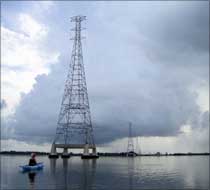India has invited Pakistan for talks over Kishenganga power project in Jammu and Kashmir, an issue over which Pakistan has threatened to move the World Bank for arbitration.
 Indus Water Commissioner G Ranganathan has written a letter to his Pakistani counterpart Syed Jamaat Ali Shah inviting him for discussing the issue, official sources said.
Indus Water Commissioner G Ranganathan has written a letter to his Pakistani counterpart Syed Jamaat Ali Shah inviting him for discussing the issue, official sources said.
Ranganathan sent the letter months after Pakistan threatened to move for arbitration the World Bank, which is third party in Indo-Pak water disputes under the 1960 Indus Water Treaty.
In his letter, Ranganathan has emphasised that approaching the World Bank was not warranted as the matter could be resolved through bilateral talks, the sources said.
Pakistan is yet to respond to the invitation, they said.
Pakistan threatened to approach the World Bank after several rounds of bilateral talks failed to end differences.
Pakistan has been opposing construction of the power project on Kishenganga, claiming that it violated the Indus Water Treaty, a contention rejected by India.
Work on the 330-MW project, whose capacity can be raised to 990 MW, started in 1994 and Pakistan immediately protested, prompting talks between the two countries to resolve it.
Under the Indus Water Treaty, Pakistan has exclusive right over three of the common rivers -- Indus, Jhelum and Chenab while India has exclusive right over Sutlej, Ravi and Beas. Kishenganga is a tributary of Jhelum river.
Pakistan has been alleging that the diversion of flow will adversely affect its agriculture and hydroelectric project on river Neelum -- as Jhelum is known across the border.
Following concerns about submergence voiced by Pakistan, India reviewed the project in 2006, converting it from a storage project to a 'run-of-river plant. The reviewed data was communicated to Pakistan in June 2006.
When contacted to comment on the issue, water resources secretary U N Panjiyar told PTI that "the provisions of the treaty have not been breached...the Kishenganga Hydro Power Project is as per the provisions of the Treaty".
Pakistan had earlier moved the World Bank for arbitration on Baglihar power project built on Chenab river in Jammu and Kashmir. Pakistan was objecting to the design and height of the dam.
The bank appointed a neutral expert, Richard Laffite who held separate discussions with representatives of the two countries and visited the dam site.
After thorough deliberations, the expert in February 2007 gave a go-ahead to the 440 MW project in Doda district with some suggestions for reduction in the dam height.








 © 2025
© 2025